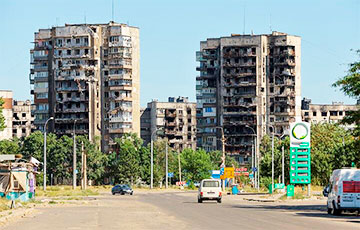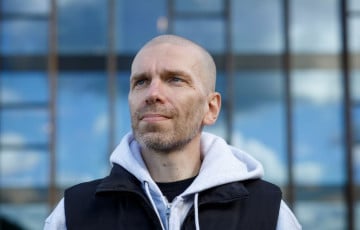Mariupol Residents: We Want Liberation
2- 30.06.2025, 13:23
- 12,300

What's really going on in the Russian-occupied city.
"Most of Mariupol is still in ruins." The BBC writes about what Mariupol residents say about life in the occupied city.
"What is shown on Russian television is fairy tales for fools. Most of Mariupol still lies in ruins," said Oleg, a Ukrainian who lives in Russian-occupied Mariupol. We have changed his name because he fears reprisals from the Russian authorities.
"They are repairing the facades of buildings on the main streets where they bring TV cameras to film. But around the corner are ruins and emptiness. Many people are still living in dilapidated apartments whose walls are barely holding up," he said.
It has been just over three years since Mariupol was taken by Russian forces after a brutal siege and indiscriminate bombardment - a key moment in the first months of Russia's full-scale invasion of Ukraine.
Thousands of people have been killed and the UN estimates that 90% of residential buildings have been damaged or destroyed.
Mariupol has also faced serious water shortages.
"The water goes for a day or two and then it doesn't come for three days. We keep buckets and jerry cans of water at home. The water is so yellow that even after boiling it is scary to drink," said Pyotr, another Mariupol resident whose name has been changed.
Some even say the water looks like "Coca-Cola."
Sergei Orlov, who calls himself Mariupol's deputy mayor-in-exile, says the Seversky Donets-Donbass canal, which supplied the city with water, was damaged during the fighting.
"Only one reservoir remains, supplying Mariupol with water. For the city's current population, this would have been enough for about a year and a half. As the occupation has lasted longer, this means there is no drinking water at all. The water that people use does not meet even the minimum standards of drinking water quality," Orlov said.
Residents say that electricity is often cut off, food is expensive and medicines are in short supply.
"Basic medicines are not available. Diabetics can hardly get insulin on time and it is insanely expensive," says Pyotr.
The BBC contacted Mariupol's Russian administration for comment on claims of water shortages and the search for an alternative water supply. So far we have received no response.
Despite the hardships of life in the city, residents say the hardest part is seeing what Ukrainian children are taught at school.
Andrey Kozhushina studied at Mariupol University for a year after its occupation. Now he has fled to Dnipro.
"They teach children fakes and propaganda. For example, school textbooks say that Donetsk, Luhansk, Kharkiv, Zaporizhzhya, Kherson, Odessa, Crimea and even Dnipropetrovsk regions have already become part of Russia," Kozhushina said.
He also spoke about special classes called "Talking About Important Things," in which children are taught how "Russia liberated the Russian-speaking population of these regions from the Nazis in 2022."
"Teachers who refuse to teach these lessons are intimidated or fired. It's like reprogramming the minds of our children," said Mariupol resident Oleg.
During Victory Day celebrations in May, Mariupol's central square displayed images of children and adults in military uniforms participating in a parade - these Soviet-era traditions, which Ukraine has all but abandoned, are now being imposed in the occupied territories. Mariupol was decorated in the colors of the Russian flag - red, blue and white.
But some Ukrainians are leading a secret resistance to Russia and at night paint the walls in the colors of the Ukrainian flag - blue and yellow - and post flyers reading "Liberate Mariupol" and "Mariupol is Ukraine."
Peter and Oleg are members of a resistance group, of which Andrei Kozhushina was a member while he lived in Mariupol.
"These inscriptions are meant to morally support our people, to let them know that the resistance lives," says Peter.
Their main goal is to collect intelligence for the Ukrainian army.
"I document the movements of Russian troops. I analyze where they transport weapons, how many soldiers enter and leave the city, what weapons are being repaired in our industrial areas. I secretly take photos of the city to then pass them to Ukrainian intelligence through secure channels," says Petro.
Sometimes resistance groups also try to sabotage civilian or military operations. On at least two occasions, rail service to the city has been interrupted because activists set fire to a relay cabinet.
It's a risky business. Andrey Kozhushina says he was forced to leave Mariupol when he realized he had been exposed.
"Perhaps I was ratted out by a neighbor. But one day, when I was buying bread at the store, I saw a soldier showing the cashier my picture and asking if they knew this person," he recalled.
Kozhushina immediately left Mariupol, slipping past checkpoints. He had to pass through many cities in Russia and Belarus before entering Ukraine from the north.
For those who stayed in Mariupol, every day is an ordeal.
"Every day you delete correspondence on your phone because it can be checked at roadblocks. You are afraid to call your friends in Ukraine because your phone could be tapped," says Pyotr.
"A man from a neighboring house was arrested right on the street because someone denounced him for allegedly passing information to the Ukrainian military. Your life is like a movie: constant tension, fear and distrust," he adds.
While negotiations between Ukraine and Russia continue, one can hear both inside and outside Ukraine the opinion that Kiev will have to cede some territory to Moscow in exchange for a peace agreement.
"Giving up territory for a 'deal with Russia' would be a betrayal. Dozens of people risk their lives every day and transmit information to Ukraine not so that some diplomat in a suit will sign a paper and 'hand us over' to Russia," Oleg says. - "We don't want 'peace at any price'. We want liberation.










